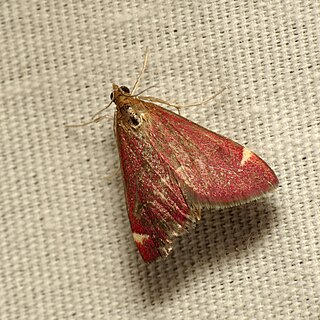
Pyrausta is a speciose genus of moths of the family Crambidae. The genus was erected by Franz von Paula Schrank in 1802.
Loxostege brunneitincta is a moth in the family Crambidae. It was described by Eugene G. Munroe in 1976. It is found in North America, where it has been recorded from California, Oregon, Nevada and Colorado.
Pyrausta andrei is a moth in the family Crambidae. It was described by Eugene G. Munroe in 1976. It is found in North America, where it has been recorded from Texas.
Pyrausta antisocialis is a moth in the family Crambidae. It was described by Eugene G. Munroe in 1976. It is found in North America, where it has been recorded from New Mexico and Arizona.

Pyrausta arizonicalis is a moth in the family Crambidae. It was described by Eugene G. Munroe in 1976. It is found in North America, where it has been recorded from Texas, New Mexico and Arizona.

Pyrausta californicalis, the California pyrausta moth, is a moth in the family Crambidae. It was described by Alpheus Spring Packard in 1873. It is found in North America, where it has been recorded from British Columbia to California.

Pyrausta fodinalis is a moth in the family Crambidae. It was described by Julius Lederer in 1863. It is found in North America, where it has been recorded from British Columbia to Quebec and the north-eastern United States. It is also present in California, Nevada, Colorado and Wyoming. The habitat consists of undisturbed prairie and grassland areas.

Pyrausta grotei is a moth in the family Crambidae. It was described by Eugene G. Munroe in 1976. It is found in North America, where it has been recorded from Washington, Oregon, Montana, California, Utah, Colorado, Wyoming, Nevada, Arizona and Texas.

Pyrausta insignitalis, the dark-banded pyrausta moth, is a moth in the family Crambidae. It was described by Achille Guenée in 1854. It is found in the United States, where it has been recorded from Florida and South Carolina. It is also found on the West Indies, as well as in Central and South America.
Pyrausta klotsi is a moth in the family Crambidae. It was described by Eugene G. Munroe in 1976. It is found in North America, where it has been recorded from southern Arizona, New Mexico and Texas.

Pyrausta perrubralis is a moth in the family Crambidae. It was described by Packard in 1873. It is found in North America, where it has been recorded from British Columbia, California, New Mexico, Oregon and Washington.

Pyrausta pseuderosnealis is a moth in the family Crambidae. It was described by Eugene G. Munroe in 1976. It is found in Mexico and the United States, where it has been recorded from California, Texas, Florida, Alabama, Georgia, Iowa, Mississippi, South Carolina, Louisiana, Arkansas, Missouri, Illinois and Oklahoma.
Pyrausta pseudonythesalis, the Shasta pyrausta moth, is a moth in the family Crambidae. It was described by Eugene G. Munroe in 1976. It is found in North America, where it has been recorded from California, Nevada, Arizona, New Mexico and Texas.
Pyrausta retidiscalis is a moth in the family Crambidae. It was described by Eugene G. Munroe in 1976. It is found in North America, where it has been recorded from Texas.
Pyrausta roseivestalis is a moth in the family Crambidae. It was described by Eugene G. Munroe in 1976. It is found in North America, where it has been recorded from California and southern Arizona.
Pyrausta scurralis is a moth in the family Crambidae. It was first observed and described by George Duryea Hulst in 1886. It is found in North America, where it has been recorded/reported in the Canadian provinces of Ontario, Manitoba and Saskatchewan to the US states, California, Arizona, and New Mexico and in Mexico. The habitat consists of undisturbed, shrubby aspen parkland.
Pyrausta shirleyae is a moth in the family Crambidae. It was described by Eugene G. Munroe in 1976. It is found in North America, where it has been recorded from Florida.
Pyrausta socialis, the sociable pyrausta moth, is a moth in the family Crambidae. It was described by Augustus Radcliffe Grote in 1877. It is found in North America, where it has been recorded from Ontario west to British Columbia, south to Montana and Colorado.
Pyrausta subgenerosa is a moth in the family Crambidae. It was described by Eugene G. Munroe in 1976. It is found in North America, where it has been recorded from California.
Pyrausta subsequalis is a moth in the family Crambidae. It was described by Achille Guenée in 1854. It is found in North America, where it has been recorded from southern Alberta and southern British Columbia south to Arizona and New Mexico. The habitat consists of dry prairie areas.








